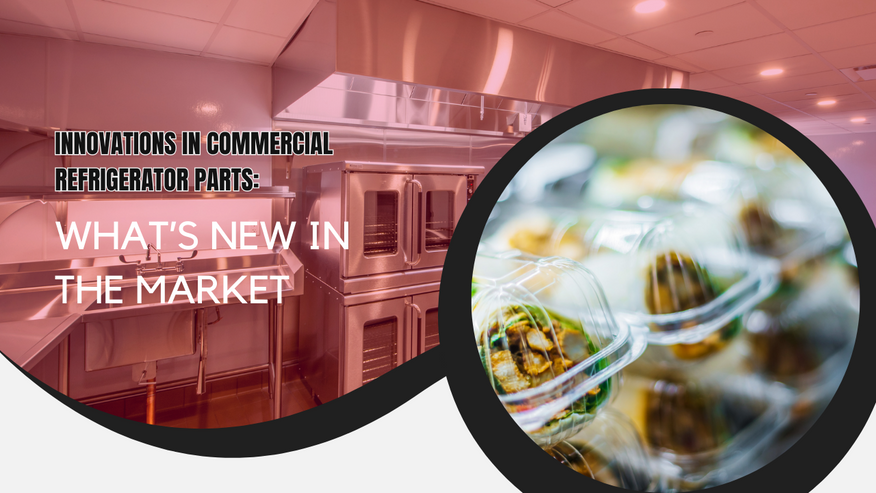Mar 5th 2024 - Team Member
Innovations in Commercial Refrigerator Parts: What’s New in the Market
In the dynamic landscape of commercial kitchens, the evolution of commercial refrigerator parts plays a pivotal role in enhancing efficiency, reducing operating costs, and meeting the growing demand for sustainable solutions. This article delves into the latest trends and innovations in commercial refrigerator parts, exploring their impact on the industry and the environment.
Advancements in Refrigeration Technologies
Smart Sensors and IoT Integration
Smart sensors and Internet of Things (IoT) technology have revolutionized the monitoring and control of refrigeration systems. These sensors continuously collect data on temperature, humidity, and energy consumption, enabling real-time adjustments to optimize performance. IoT integration allows for remote monitoring and management, reducing maintenance costs and minimizing downtime.
Energy-Efficient Compressors and Motors
Energy efficiency is a key focus in commercial refrigeration. Manufacturers are developing compressors and motors that consume less energy while maintaining optimal performance. These components help reduce operating costs and carbon emissions, making them ideal for businesses looking to adopt sustainable practices.
Advanced Insulation Materials
Innovations in insulation materials have led to better thermal performance, ensuring that cold air is retained inside the refrigerator. This not only reduces energy consumption but also helps maintain more stable temperatures, preserving food quality and safety.
Durability and Longevity
Corrosion-Resistant Coatings
Commercial kitchens are prone to harsh environments that can accelerate corrosion. Manufacturers are now using corrosion-resistant coatings for critical components, prolonging the lifespan of refrigeration equipment and reducing maintenance costs.
High-Quality Gaskets and Seals
Proper sealing is essential for maintaining temperature consistency. New gaskets and seals are more durable, preventing air leaks and reducing energy waste.
Improved Defrost Systems
Efficient defrost systems are crucial for maintaining optimal performance. Advanced algorithms and sensors are being integrated into defrost systems, optimizing defrost cycles and reducing energy consumption.
Impact on the Commercial Kitchen Industry
Cost Savings and Efficiency
The innovations in commercial refrigerator parts lead to significant cost savings and improved efficiency for businesses. Energy-efficient components reduce operating costs, while durable parts reduce maintenance expenses and downtime.
Enhanced Food Safety and Quality
Maintaining precise temperatures is critical for food safety and quality. The advancements in refrigeration parts ensure that refrigerators can maintain the correct temperature, reducing the risk of foodborne illnesses and preserving the quality of perishable food items.
Environmental Sustainability
By reducing energy consumption and extending the lifespan of refrigeration equipment, these innovations contribute to environmental sustainability. Businesses can reduce their carbon footprint and operate more sustainably, meeting the growing demand for eco-friendly practices in the foodservice industry.
Market Trends and Outlook
The global commercial refrigeration equipment market is experiencing steady growth, driven by the demand for energy-efficient solutions and the expansion of the food retail and tourism sectors. North America and Europe are leading markets, with Asia Pacific and Latin America showing significant growth potential.
Key Players and Innovations
Hussmann Corporation, Excellence Industries, and other industry leaders are at the forefront of innovation, developing advanced products and solutions to meet the evolving needs of the market. Refrigerated display cases, commercial freezers, and ice machines are among the most sought-after products, driven by the increasing demand for frozen food products and consumer food products.
Future Prospects and Challenges
The commercial refrigeration industry is expected to continue its growth trajectory, driven by advancements in technology and increasing consumer demand for sustainable solutions. However, challenges such as high installation costs and the need for continuous innovation remain. Machine learning and advanced technology are expected to play a crucial role in overcoming these challenges and driving further growth in the industry.
In conclusion, the innovations in commercial refrigerator parts are reshaping the commercial kitchen industry, driving efficiency, sustainability, and cost savings. Businesses that embrace these advancements stand to gain a competitive edge in a rapidly evolving market while contributing to a greener, more sustainable future.

